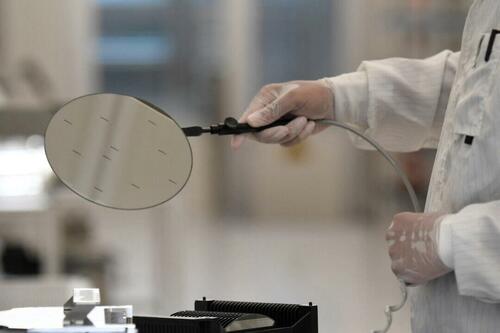Chipmaker Nexperia’s China Arm Tells Staff To Ignore Dutch HQ, Deepening Semiconductor Split
Authored by Tom Ozimek via The Epoch Times,
China’s arm of chipmaker Nexperia has instructed employees to disregard directives from its Dutch headquarters, marking an escalation in a spiraling cross-border confrontation over control of the company that has already raised alarm bells across the global automotive and electronics supply chain.
In an internal memo published on Oct. 19 on its official WeChat account over the weekend, Nexperia China told staff that they are to follow orders only from the domestic management team and have the “right to refuse execution” of any external instructions—even if delivered through official corporate communications platforms such as Outlook or Microsoft Teams—unless approved by a China-based legal representative.
The notice, signed by multiple Chinese subsidiaries, said that Nexperia’s China operations are legally independent under Chinese corporate law and will continue to operate “as a Chinese enterprise,” with full decision-making authority remaining inside China. It also stated that all salaries, bonuses, and benefits would be paid exclusively by Nexperia China, not by the Netherlands-based parent.
The memo followed an extraordinary intervention by the Dutch government, which earlier this month imposed direct supervision over Nexperia’s global management, citing “serious governance shortcomings” and fears that critical chipmaking capabilities could be transferred to Chinese ownership. The move was made under the rarely used Cold War-era Goods Availability Act, marking the first such action in Dutch industrial history.
As part of the move, Dutch authorities suspended Nexperia CEO Zhang Xuezheng—founder of Wingtech Technology, the China-based company that owns Nexperia—and installed an interim European leadership. The decision drew immediate condemnation from Beijing and Wingtech, which accused The Hague of “discriminatory treatment” and “excessive intervention based on geopolitical bias.”
At the same time, China’s Ministry of Commerce blocked shipments of Nexperia’s finished goods and sub-assemblies from Chinese factories, effectively halting exports to Europe. With up to 80 percent of Nexperia’s final packaging and assembly located in mainland China, the block has deepened a split in corporate command.
Nexperia Netherlands condemned the Chinese memo in a statement to several media outlets, accusing its ousted CEO of spreading “falsehoods” that the Dutch headquarters had abandoned its China business or ceded control.
“We regret that certain individuals … see the need to spread these falsehoods, and remain hopeful to come to a solution that allows Nexperia to continue serving its customers and partners, and one that brings stability for its employees,” the company stated.
The Epoch Times reached out to Nexperia for comment and additional details of its response to the memo from the Chinese arm, but did not receive a response by publication time.
Industry groups across Europe and the United States have warned that the dispute could trigger supply chain shockwaves within weeks. Nexperia produces mature-node semiconductors used across most modern vehicles—components that, although not advanced, are manufactured in the tens of millions.
“Without these chips, European automotive suppliers cannot build the parts and components needed to supply vehicle manufacturers,” the European Automobile Manufacturers’ Association said in an Oct. 16 note.
In Washington, the Alliance for Automotive Innovation issued a similar alert.
“If the shipment of automotive chips doesn’t resume–quickly–it’s going to disrupt auto production in the U.S. and many other countries and have a spillover effect in other industries,” said the group’s CEO, John Bozzella. “It’s that significant.”
Volkswagen and BMW have confirmed they are conducting contingency planning. While neither has yet paused assembly lines, both said current chip inventories would only cover a limited window.
Dutch Economy Minister Vincent Karremans is expected to meet his Chinese counterpart and the European Commission in the coming days to discuss the dispute.
“Europe would have been 100 percent dependent for these sort of chips, in terms of knowledge, expertise and capacity, on foreign countries,” Karremans said in an interview with Dutch television show Buitenhof on Oct. 19, referring to the imperative behind the Dutch government’s decision to seize control of Nexperia.
The dispute also reflects a wider battle over chips between China and the West. The United States has blacklisted Nexperia’s parent company, Wingtech, and pushed allies such as the Netherlands to tighten export controls, while Beijing has responded with its own curbs—turning semiconductor companies into geopolitical battlegrounds.
Tyler Durden
Mon, 10/20/2025 – 10:50ZeroHedge NewsRead More





 R1
R1
 T1
T1


